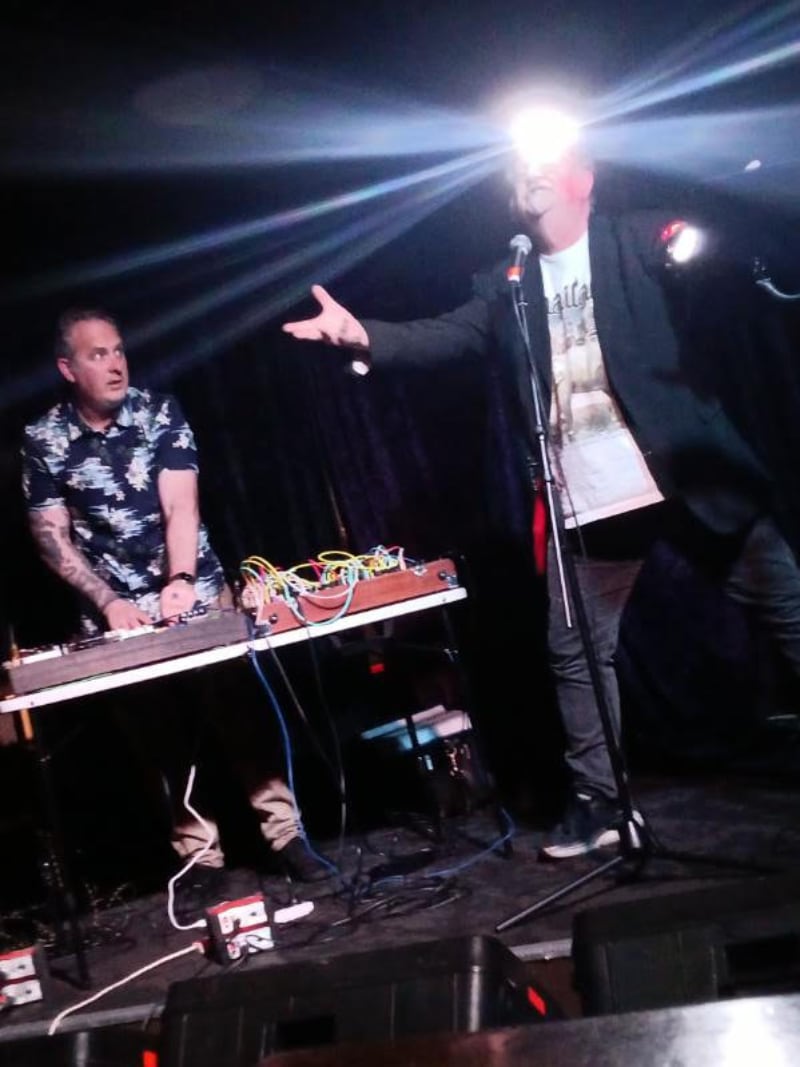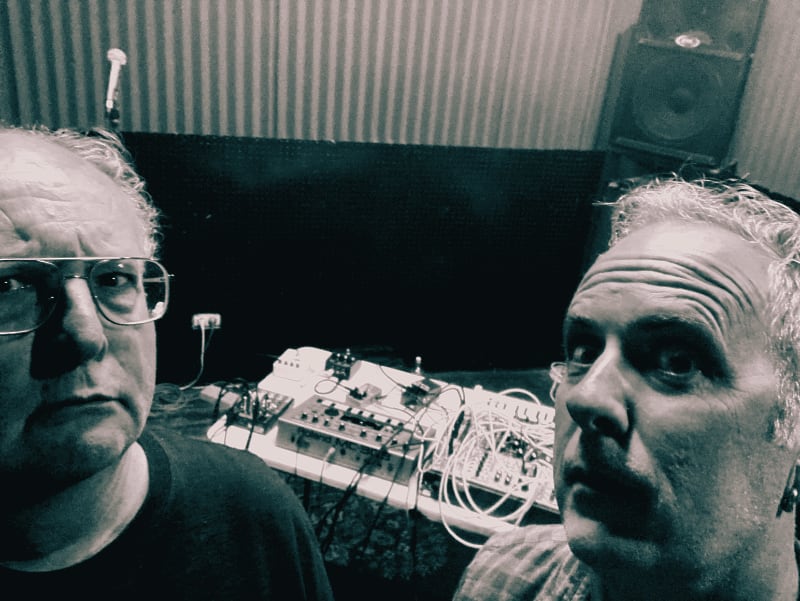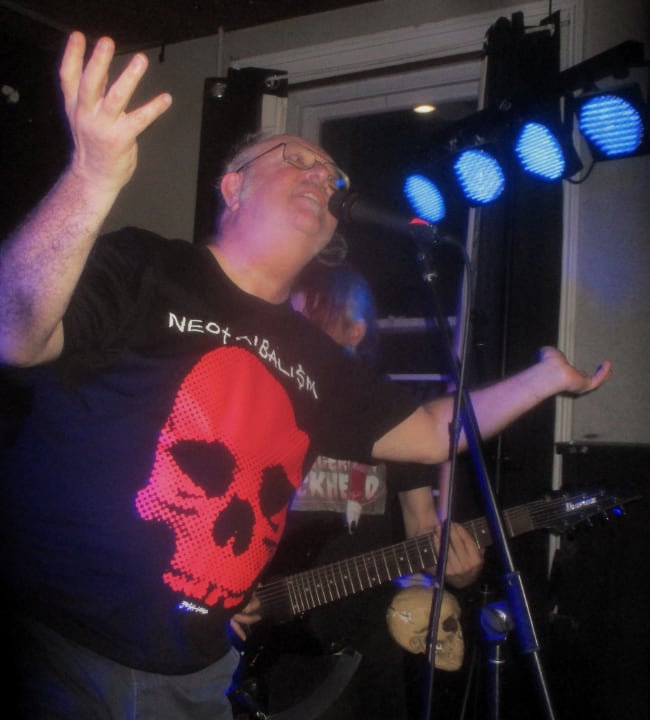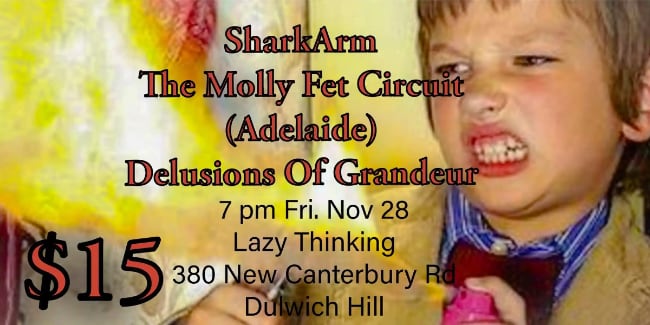 Sam Geldart photo
Sam Geldart photo
What do you get when you mix middle-aged Adelaide writer, I-94 Bar scribe and self-described vocalist with Smallpox Confidential, Robert Brokenmouth, with veteran City of Churches synth exponent Shaun C Duncan? They call it Ambient Horror Goth Industrial Punk Drone Synth Machinery Slagheap, and it goes under the name Molly Fet Circuit.
Molly Fet Circuit has never been sighted outside of Adelaide but has been well exposed on the city’s leading community radio station, 5AA. We’ve been treated to a taste of the Molly Fet Circuit oeuvre and songs like “Mustid”, “Liquid” and “Could Not” are starkly industrial, antagonistic and intriguing (in a Suicide sort of way.)
Molly Fet Circuit is coming to Sydney this month, for shows at Lazy Thinking in Dulwich Hill (Novermber 28) and MoshPit (November 29). Ticket links at the end.
Now this Brokenmouth bloke is a Bar regular, often being swept out long after post-closing staff drinks, We’ve seen lots of him so we chased down his partner in decibels, Shaun C Duncan, for an interview - and he graciously accepted.
 Robert and Shaun in the studio.
Robert and Shaun in the studio.
I-94 BAR: Obvious question first: What is a Molly Fet Circuit? Does it have anything to do with an Eddy Current Suppression Ring?
A Molly Fet Circuit is a type of sinusoidal polyphase circuit employing a series of parallel feedback chains to create an unstable system in which each waveform is being used to frequency modulate another. It was first developed by Dr Ian Meldrum in the early ‘70s but became notorious in the mid-2000s when it was revealed that the US government was using MFCs on captured insurgents at various CIA blacksites as part of their enhanced interrogation techniques.
I don't pretend to understand the intricacies of Molly Fet Circuit - I just operate one as when instructed to do. You could probably rig one up to an Eddy Current Suppression Ring but it would likely tame some of the MFC's inherent instability, which rather defeats the purpose of the exercise.
I-94 BAR: Side note: Molly is slang for MDMA. Is that a comment on your name or your fanbase?
My understanding is that MDMA is a euphoric, prosocial empathogen with mild psychedelic properties. We are the antidote to that sort of thing.
I-94 BAR: How long has MFC been a going concern? How did you form and how many gigs have you played?
I first met Robert on a bus in 1994 when I was 18. He commented on the Throbbing Gristle shirt I was wearing and then proceeded to lecture me about The Birthday Party until finally I got off two stops before my destination.
It turned out we had friends in common and so would see each other regularly at shows over the course of a 30-year acquaintanceship. I was surpised and delighted when, about 18 months ago, he first suggested we start a band. I hadn't worked with a vocalist before, but I really enjoyed his lyrics and stage presence with Smallpox Confidential, so I knew we'd be able to do something good if he could stand the idiosyncracies of my working methods.
We've written about 30 tracks since then but have only played four or five live shows - Adelaide's a small place with a limited number of venues so it's easy for people to get sick of sight of you if you play too often.
I-94 BAR: How much of an audience is there in Adelaide for avant garde/experimental music and what sort of places do you play?
There's a small but dedicated scene in Adelaide but only a handful of venues, like the Metro or Arthur Art Bar who'll put up with any sort of avant garde nonsense. Sadly, in recent years with all the noise regulations and the kind of general killjoy vibe which has always been a bit of a problem in Adelaide, it's getting harder to secure what I'd call good gigs. Mixers tend to get a bit spooked when they see a modular synth and I'm often not able to play at the sort of volume I'd like.
I-94 BAR: Robert Brokenmouth’s background is known to other staff at the I-94 Bar. What about yourself and how do you feel about him calling you a musician? Talk about your other bands.
I started doing noise in 1992 when I was 16. I was a big fan of the late 70s industrial scene (Throbbing Gristle, SPK etc) and was fascinated by other groups I hadn't heard like Whitehouse and some of the noise stuff that had been going on in Japan in the ‘80s.
It was hard to actualIy hear much of that stuff in Adelaide back then though as none of the record shop stocked it, so I sort of imagined what they might have sounded like and went from there. In the 90s I performed under various names such as VOLUPTUOUsmedia, Maggot Death, DSR, Iron Phallus and probably a few more I've forgotten and then in the early 2000s I settled on the name Die Like A God and that's what I've been known as (to the extent that I'm known) ever since.
In the early days I mainly played performance art events and that sort of thing (no one did electronic music in pubs) but eventually I sort of fell in with the grindcore crowd, which was kind of fun. I don't mind being the odd one out on a bill - half the audience might hate it but there's usually a few people there who've never seen me perform before and really enjoy it.
 Robert rips into the chorus of "Sweet Caroline" and Adelaide sings along.
Robert rips into the chorus of "Sweet Caroline" and Adelaide sings along.
I was/am also a member of White Tiger A:. A:. who seem to achieved some sort of strange, semi-legendary status among a certain degenerate crowd despite only doing two shows, but I can't remember if we're supposed to be keeping our identities secret so maybe keep that one under your hat.
When it comes to the noise stuff, I don't really call myself a musician simply because my approach has usually been to strip anything which might be considered even vaguely musical out of the sound. I prefer to think of it as manipulating air pressure. I have no issue with the label in general terms though - I played multiple instruments in an improv Kraut-rockish sort of band in Melbourne called Council Of Elders for 12 years, which was a lot of fun and I think The Molly Fet Circuit are quite musical at the end of the day.
I-94 BAR: I’m hearing a lot of Suicide in MFC’s sound and Robert’s vocal betrays his love of The Fall with a bit of Alan Vega thrown in for good measure. Is that an accurate summation? Talk about your other influences, shared or otherwise.
Suicide and The Fall are both influences, but mainly in terms of strategy. I like to work with a fairly restricted set-up and as little pre-programming as possible, usually nothing more than a beat and a simple bassline that I can improvise on top of, so this alone sort of pushes you into the sort of territory where those comparisons are inevitable, particularly when you add Robert's vocals into the mix.
For MFC, I take a lot of influence from some of the early electro/EBM groups like Portion Control, The Klinik, and Smersh along with a dose of Birmingham techno (British Murder Boys etc) but a lot of my approach is also influenced dub and Japanese noise acts like Hijokaidan and Merzbow.
As far as shared influences go, Robert and I are both big fans of Kraftwerk but I'm not sure how much of that shows in what we do. We never approached MFC with the idea of any particular sound though - we each respected what the other could potentially bring to the collaboration and we just let it evolve from there.
Robert's only stipulation as far as music goes was to have something to hold on to (my solo stuff is rather... abstract) which is why I took a more rhythmic approach than I have in the past.
I-94 BAR: Robert actually confessed that he was off to a rehearsal. How frequent are these and what proportion of MFC’s music is improvised or spontaneous?
We do rehearse in the lead-up to shows, but generally not for very long - we'll play each song in the set once, have a chat and then be home within an hour or so. It's really just to make sure the connection is there as performers. I like spontaneity, particularly when it comes to electronic music because too often it becomes very rigid and as an audience member you feel like you're just listening to someone's Soundcloud through a shitty PA.
I'm always tinkering with the tracks in my spare time and given much of the sound is generated from fairly complicated and unstable patches on an analog modular synthesizer, the slightest turn of a knob which transform the sound radically, so there's no hope of being ever really being able to play the same song the same way twice.
I think Robert found that a little confronting at first, but he quickly embraced it. It's a fun way of working, but kind of the opposite way you'd go about things in a regular band where you're rehearsing to make sure everyone's in sync, on time, and in key. By contrast we're usually looking for ways to loosen up and introduce elements of chaos to overcome the rigidities of machine-made music.
I-94 BAR: What brings you both to Sydney and why not Melbourne?
We're planning to do Melbourne early next year, but I lived and gigged there for a bit over a decade and I'm not in a mad rush to go back. On the other hand, I haven't set foot in Sydney in about 20 years and I've never played there so I find the idea a lot more exciting. I expect it'll be a lot of fun if I don't get lost on my way to the venues.
I-94 BAR: Just two shows in Sydney. What should people expect?
Given the way we work, I'm not entirely sure myself. We'll be playing a couple of tracks we've never performed publicly before and even though it'll be the same set-list for both shows (maybe), no doubt they'll both be different. I can confidently say though that it'll be noisy, aggressively percussive and hopefully loud.
I'm sure Robert will throw in a few crap jokes between songs, probably at my expense, and he usually harasses a few members of the audience as well. A good time will be had by some.

I-94 BAR: When will MFC be releasing something commercially and how large will the sheep station be that you buy from the royalties?
We're currently in the process of mixing a bunch of tracks which will most likely become an album sometime next year and we plan to drip-feed a few tracks into the digital realm in the coming months. Once the Spotify royalties start coming in, we can finalise the deal to acquire that cattle station where Aum Shinrikyo tested chemical weapons on sheep back in the ‘90s. Not much grows there anymore, but it should be fine for what we have planned.
I-94 BAR: Since we’re in a bar, what are you drinking?
A fluffy duck - and make it a double.
Molly Fet Circuit plays Lazy Thinking at Dulwich Hill with Shark Arm and Delusions of Grandeur on Friday, November 28 (7pm) and tickets are on sale here. They will be sole support to Fuck The Neighbours at their sold-out show at MoshPit Bar on Saturday November 29 (2.30pm doors).

